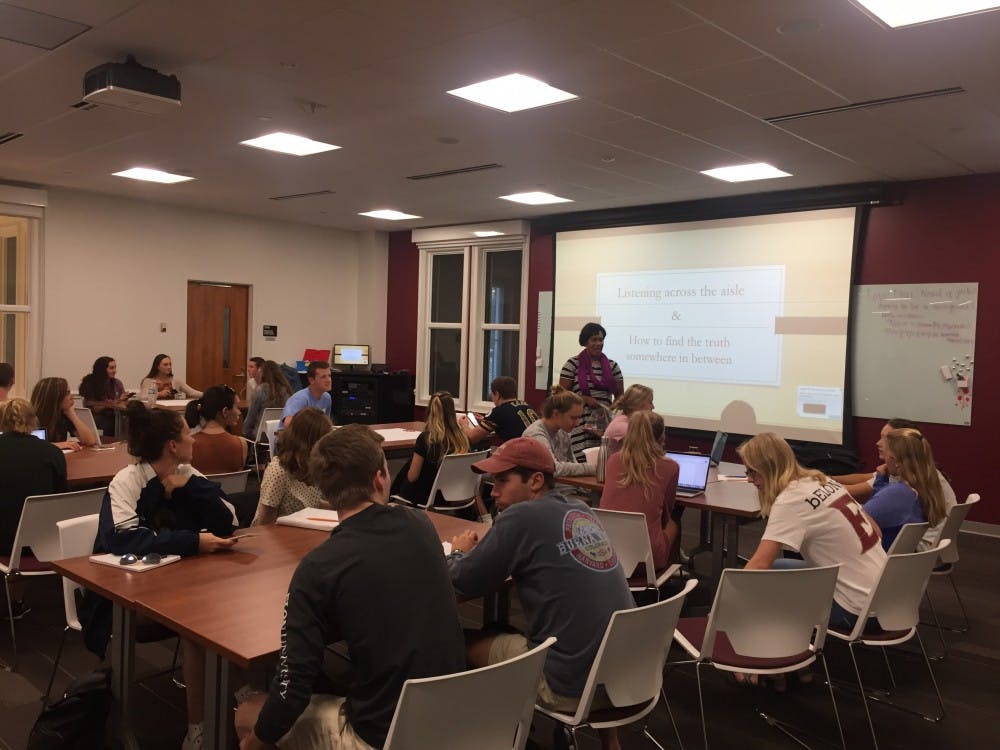More than 70 students gathered Wednesday night to consider diverse viewpoints at a discussion called “Listening Across the Aisle: How to Find the Truth Somewhere in Between.”
As part of the Active Citizen Series sponsored by Elon Votes!, the discussion focused on the importance of opening the lines of communication between those of opposing political views and how the media we consume can help shape those conversations.
Naeemah Clark, associate professor of communications, facilitated the event. Clark says she wanted to lead the discussion because she believes now is a more important time than ever to have these conversations.
“We are more politically divided than ever before. We have to start listening or we’re gonna be very lonely people,” Clark said. “There’s a study that was out today that says because we’re more politically divided, we tend to feel lonelier. I think that we have to start working a little better to have these conversations and to understand the other's points of view.”
Clark says the first step in bridging the divide is finding common ground.
“I’ve started with Beyoncé,” Clark said.
While this response elicited laughs from the audience, not all topics of conversations were as light-hearted.
Clark showed several pictures on a slideshow to the audience and asked them to say the first thing these pictures brought to mind. Upon showing a picture of President Donald Trump, audience responses included “cheater,” “racist” and “disgust.”
“Anybody say president?” Clark asked the audience. “No one had a good feeling?” The room fell silent.
“You still live in this country,” Clark said. “We need to find some commonality, we need to find something in common with someone who likes him.”
Clark asked students to come up with something favorable to say about Trump. Most of their responses centered around his business and media skills, but no one spoke up in support of Trump’s presidency. Clark said she knows for a fact there was a Trump supporter in the audience, but believes he didn’t speak up out of fear.
But Clark says opening yourself up to productive conversations is key in bridging the gap between both sides.
“Challenge facts, not people. You don't want to take someone's humanity away,” Clark said. “When you start working in the concreteness of it, it takes some of the anxiety away from saying something, and it gives us a firmer place to stand.”
Clark says having better conversations starts with a willingness to learn. She says you have to know what the other side is saying in order to engage in proactive discussions.
In a breakout group activity, students drew their own political spectrums of how biased mainstream news organizations are — the most conservative, the most liberal and the most unbiased. The results varied group by group, and Clark attributes this to individual perspectives.
"What is left and what is right is not necessarily shaped by what the rules are, but by who you are,” Clark said.
She encouraged students to pick one news organization to start following with a bias opposite of their own in order to recognize and understand various points of view. Clark says this will not only help students to be better informed, but will also help on a personal level.
“We kind of need to remember that when we're having these conversations we're trying to learn, we're trying to become better citizens, we're trying to repair friendships in some instances,” Clark said. “When we go back to what it is we can agree with we can at least salvage these relationships.”
The Active Citizen Series is a program designed to enhance civic engagement on Elon’s campus. The program’s next event will be a workshop entitled “Writing for Action - Writing Persuasive Letters to Elected Officials and Newspapers.” The workshop will be held at 4:15 p.m. Oct. 24 in Moseley 215.


